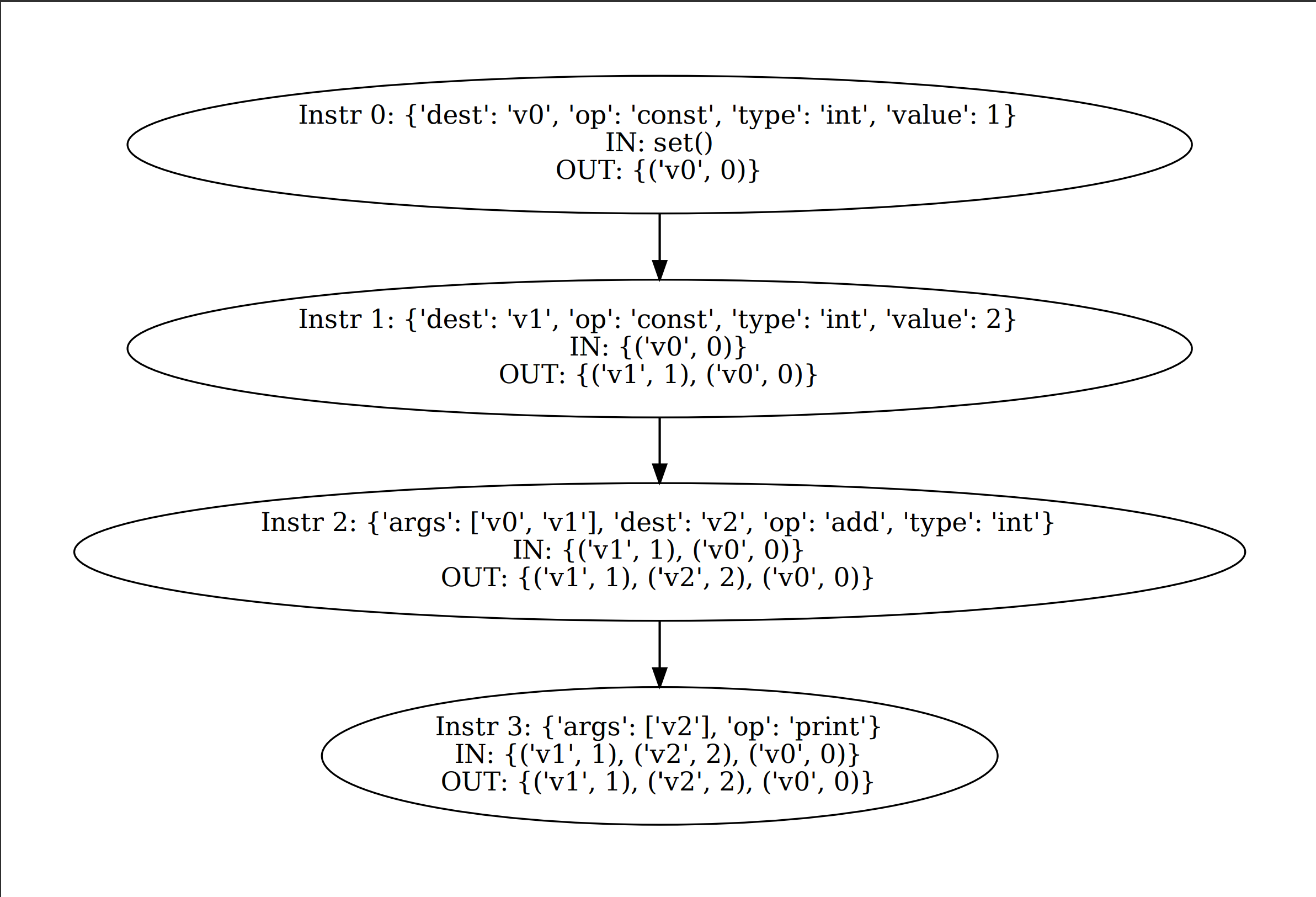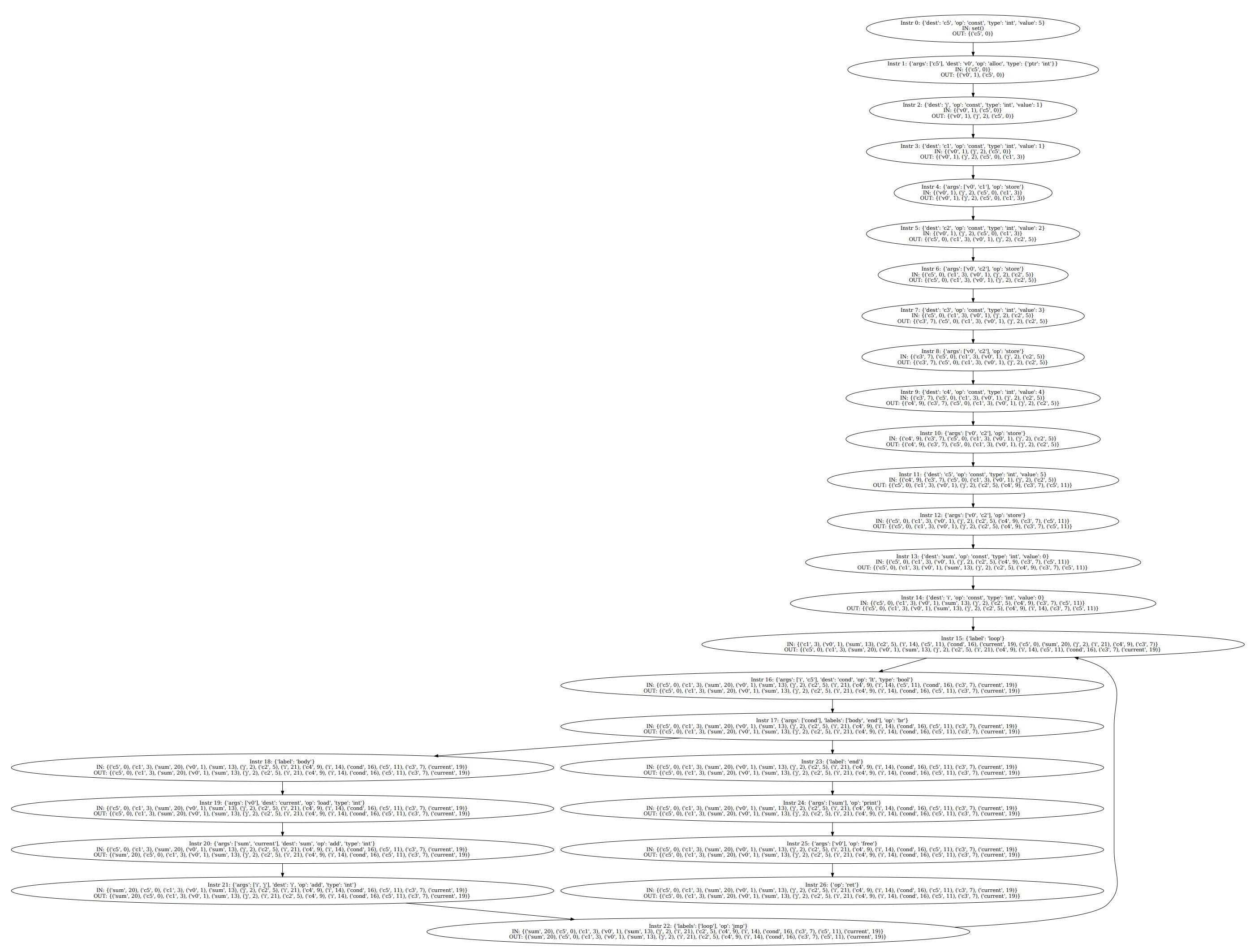Homework3 - Yashaswini
Data Flow Analysis
About the Code:
- creates a flow diagram for a given bril code. can choose whether to ggo forwards,ay must, ect.
’’’ import json from collections import defaultdict import graphviz
def load_bril_program(filename): “““Load the Bril program from a JSON file.”“” with open(filename, ‘r’) as file: return json.load(file)
def build_cfg(function): “““Build the Control Flow Graph (CFG) for a given function.”“” instrs = function[‘instrs’] cfg = defaultdict(list) label_map = {}
# Map labels to instruction indices
for i, instr in enumerate(instrs):
if 'label' in instr:
label_map[instr['label']] = i
for i, instr in enumerate(instrs):
if 'op' in instr and instr['op'] == 'jmp':
target = label_map[instr['labels'][0]]
cfg[i].append(target)
elif 'op' in instr and instr['op'] == 'br':
target1 = label_map[instr['labels'][0]]
target2 = label_map[instr['labels'][1]]
cfg[i].extend([target1, target2])
else:
# Fall-through case: connect to the next instruction
if i + 1 < len(instrs):
cfg[i].append(i + 1)
return cfgdef predecessors(cfg): “““Find predecessors for each node in the CFG.”“” pred = defaultdict(list) for node, successors in cfg.items(): for succ in successors: pred[succ].append(node) return pred
def generic_data_flow_analysis(function, transfer_fn, gen_fn, kill_fn, direction=“forward”, merge=“union”): “““Perform a generic data flow analysis on the given function.”“” cfg = build_cfg(function) preds = predecessors(cfg)
# Initialize IN and OUT sets for all nodes
in_sets = defaultdict(set)
out_sets = defaultdict(set) # Initialize with defaultdict to avoid KeyError
# Ensure every node in the function has an entry in out_sets
for node in range(len(function['instrs'])):
out_sets[node] = gen_fn(node) # Start with GEN[n] if desired, or an empty set
changed = set(cfg.keys())
while changed:
n = changed.pop()
# Calculate IN[n] or OUT[n] based on direction
if direction == "forward":
in_sets[n] = set()
for p in preds[n]:
if merge == "union":
in_sets[n] |= out_sets[p]
elif merge == "intersection" and out_sets[p]:
in_sets[n] &= out_sets[p]
else: # Backward analysis
out_sets[n] = set()
for s in cfg[n]:
if merge == "union":
out_sets[n] |= in_sets[s]
elif merge == "intersection" and in_sets[s]:
out_sets[n] &= in_sets[s]
old_out = out_sets[n].copy() if direction == "forward" else in_sets[n].copy()
# Update OUT[n] or IN[n] using the transfer function
if direction == "forward":
out_sets[n] = transfer_fn(in_sets[n], gen_fn(n), kill_fn(n))
else:
in_sets[n] = transfer_fn(out_sets[n], gen_fn(n), kill_fn(n))
# If there's a change, update the changed set
if direction == "forward" and old_out != out_sets[n]:
for s in cfg[n]:
changed.add(s)
elif direction == "backward" and old_out != in_sets[n]:
for p in preds[n]:
changed.add(p)
return in_sets, out_setsdef reaching_definitions_transfer(in_set, gen_set, kill_set): “““Transfer function for Reaching Definitions: OUT[n] = GEN[n] U (IN[n] - KILL[n]).”“” return gen_set | (in_set - kill_set)
def reaching_definitions_gen_kill(instr, idx): “““GEN and KILL sets for Reaching Definitions.”“” if ‘dest’ in instr: gen_set = {(instr[‘dest’], idx)} kill_set = {var for var, _ in gen_set} return gen_set, kill_set return set(), set()
def create_cfg_visualization(function, in_sets, out_sets): “““Create a graphical view of the CFG with IN and OUT sets.”“” cfg = build_cfg(function) dot = graphviz.Digraph(comment=function[‘name’])
for node, instr in enumerate(function['instrs']):
label = f"Instr {node}: {instr}\nIN: {in_sets[node]}\nOUT: {out_sets[node]}"
dot.node(str(node), label)
for node, successors in cfg.items():
for succ in successors:
dot.edge(str(node), str(succ))
# Save the CFG visualization as a PDF
dot.render(f"cfg_{function['name']}", format="pdf", cleanup=True)def run_analysis(program): “““Run the generic data flow analysis on each function in the Bril program.”“” for function in program[‘functions’]: print(f”Analyzing function: {function[‘name’]}“)
def gen_fn(n):
instr = function['instrs'][n]
return reaching_definitions_gen_kill(instr, n)[0]
def kill_fn(n):
instr = function['instrs'][n]
return reaching_definitions_gen_kill(instr, n)[1]
in_sets, out_sets = generic_data_flow_analysis(
function, reaching_definitions_transfer, gen_fn, kill_fn, direction="forward", merge="union"
)
print(f"IN sets: {in_sets}")
print(f"OUT sets: {out_sets}")
# Create a graphical view of the CFG
create_cfg_visualization(function, in_sets, out_sets)def main(): # Load the Bril program from a file bril_program = load_bril_program(‘add.bril’)
# Run the analysis
run_analysis(bril_program)Run the main function
if name == “main”: main() ’’’ ## Testing:
test case: ’’’ { “functions”: [ { “instrs”: [ { “dest”: “v0”, “op”: “const”, “type”: “int”, “value”: 1 }, { “dest”: “v1”, “op”: “const”, “type”: “int”, “value”: 2}, { “args”: [“v0”, “v1”],“dest”: “v2”, “op”: “add”, “type”: “int”}, { “args”: [“v2”], “op”: “print”} ], “name”: “main” } ] } ’’’
output:

test case 2 ’’’ { “functions”: [ { “instrs”: [ {“dest”: “c5”,“op”: “const”,“type”: “int”,“value”: 5}, {“args”: [“c5”],“dest”: “v0”,“op”: “alloc”,“type”: {“ptr”: “int”}}, {“dest”: “j”,“op”: “const”,“type”: “int”,“value”: 1}, {“dest”: “c1”,“op”: “const”,“type”: “int”,“value”: 1}, {“args”: [“v0”,“c1”],“op”: “store”}, {“dest”: “c2”,“op”: “const”,“type”: “int”,“value”: 2}, {“args”: [“v0”,“c2”],“op”: “store”}, {“dest”: “c3”,“op”: “const”,“type”: “int”,“value”: 3}, {“args”: [“v0”,“c2”],“op”: “store”}, {“dest”: “c4”,“op”: “const”,“type”: “int”,“value”: 4}, {“args”: [“v0”,“c2”],“op”: “store”}, {“dest”: “c5”,“op”: “const”,“type”: “int”,“value”: 5}, {“args”: [“v0”,“c2”],“op”: “store”}, {“dest”: “sum”,“op”: “const”,“type”: “int”,“value”: 0}, {“dest”: “i”,“op”: “const”,“type”: “int”,“value”: 0}, {“label”: “loop” }, {“args”: [“i”,“c5”],“dest”: “cond”,“op”: “lt”,“type”: “bool”}, {“args”: [“cond”],“labels”: [“body”,“end”],“op”: “br”}, {“label”: “body”}, {“args”: [“v0”],“dest”: “current”,“op”: “load”,“type”: “int”}, {“args”: [“sum”,“current”],“dest”: “sum”,“op”: “add”,“type”: “int”}, {“args”: [“i”,“j”],“dest”: “i”,“op”: “add”,“type”: “int”}, {“labels”: [ “loop”],“op”: “jmp”}, {“label”: “end” }, {“args”: [“sum”],“op”: “print”}, {“args”: [“v0”],“op”: “free”}, {“op”: “ret”} ], “name”: “main” } ] } ’’’
output 